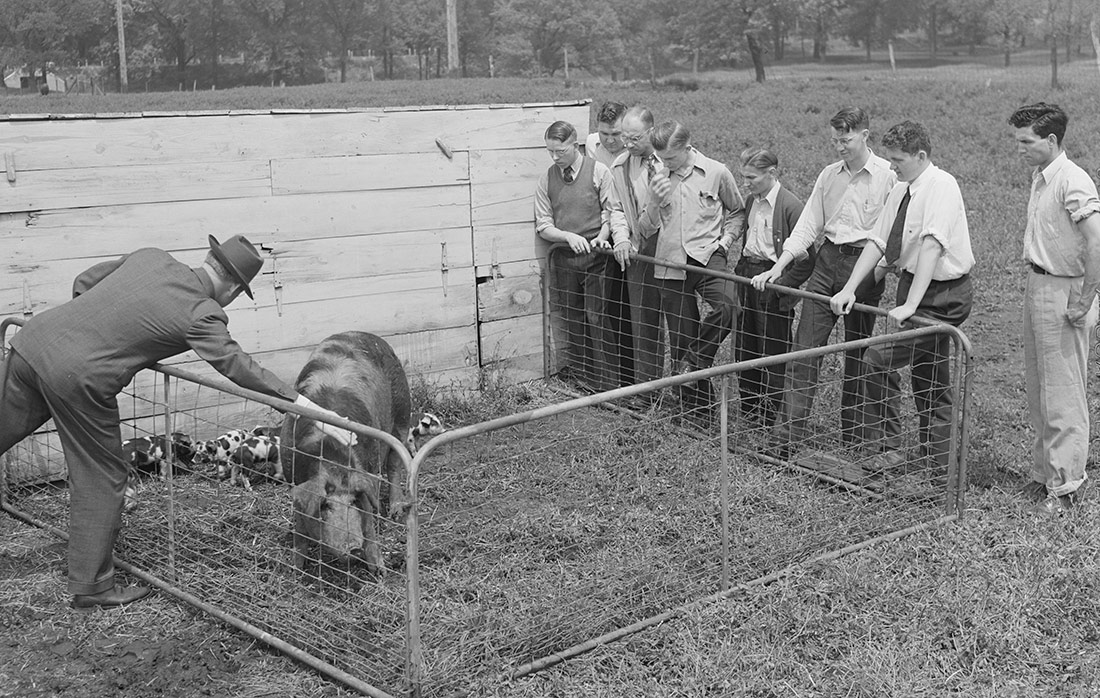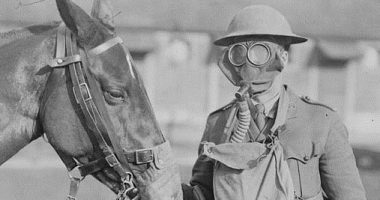
A class in animal husbandry at one of the animal husbandry farms at Iowa State College. Iowa, 1942 | Library of Congress | Public domain
The domination of nature by man, the control of population growth and the relationship between the use of animals and the appearance of new diseases are three ideas from the late 18th century that can help us to understand today’s environmental crisis. Courtesy of Levanta Fuego, we publish an excerpt from Half-Earth Socialism, in which Troy Vettese and Drew Pendergrass propose a new political and social model for a possible future.
Most of the epistemological frameworks for understanding the present environmental crisis can be traced back to one of three works written in 1798. Given the tumult of that era, this was not a particularly conspicuous year. Napoleon Bonaparte was busy fighting a fruitless campaign in Egypt and still a year from his coup d’état; the Haitian Revolution was only halfway through its thirteen-year duration; and it wasn’t until 1800 that Alessandro Volta invented the battery. Yet, tucked between the folds of these better-known events, G. W. F. Hegel, Thomas Malthus, and Edward Jenner wrote texts that would in time come to define the three main environmental paradigms. Hegel’s ‘The Spirit of Christianity and Its Fate’ was a personal essay in which he reflected on his recent reading in theology and political economy. Malthus’ Essay on the Principle of Population, the most famous text of the three, has enjoyed a lasting influence on economics, demography, and population ecology. By contrast, Jenner had to self-publish An Inquiry into the Causes and Effects of the Variolæ vaccinæ because no one else would disseminate his findings from experiments on the smallpox vaccine. We see these three texts as belonging to an unspoken debate over the knowability of nature. Each of these thinkers is a primogenitor of one of the three great lineages in environmental thought: Hegel’s Prometheanism, Malthusianism, and Jennerite ecological scepticism.
Before these men shaped the lineaments of environmental thought, they were swayed by the storm that was the French Revolution. Hegel, who is largely remembered as the grand old man of the conservative Prussian academy, was a radical student in his youth. One can find ‘Vive la liberté!!’ scrawled in his yearbook from the University at Tübingen. Meanwhile, Malthus’ Essay immediately elevated him from obscurity as a parson in Dorking to fame and infamy, as well as giving him the first chair in political economy (at a college run by the East India Company). Despite his radical upbringing – his father had greatly admired Rousseau – Malthus wrote his Essay with the conservative hope of deflecting the ‘blazing comet’ of the French Revolution before it ‘destroy[ed] the shrinking inhabitants of the earth.’ Jenner’s pamphlet on his smallpox vaccine gained traction in 1799, when the French Wars sparked an outbreak of the ‘speckled monster’ in Britain.
‘The Spirit of Christianity and Its Fate’ is one of Hegel’s lesser-known works, but it is vital for our purposes. This is because it introduces his as yet unnamed concept of ‘the humanization of nature’ (die Humanisierung der Natur) for the first time – an idea that would animate much of his philosophical oeuvre, from The Phenomenology of Spirit to Lectures on Aesthetics. The humanization of nature is the process by which humanity overcomes its alienation from nature by instilling the latter with human consciousness through the process of labour – transforming wilderness into a garden. Human labour is nature acting upon itself so it can become self-conscious, or, as Hegel puts it in the Encyclopedia, ‘The goal of Nature is to destroy itself and to break through its husk of immediate, sensuous existence, to consume itself like the phoenix in order to come forth from this externality rejuvenated as spirit.’ On this basis, Hegel and his heirs fostered the belief that the domination of nature was both feasible and historically necessary.
In ‘The Spirit of Christianity and Its Fate,’ Hegel grounds this concept in the biblical past. Between the Fall and the Flood, an era of which only ‘a few dim traces have been preserved to us,’ humans struggled to ‘revert from barbarism’ and return to a state of grace by restoring their ‘unity’ with nature. Nature rebuffed such efforts with the Flood, leaving humanity with three choices, each represented by a biblical figure. Noah rebuilt the world through divine law, which controlled violence among people as well as violence between humanity and nature. Rejecting this juridical peace, Nimrod subdued both people and nature to his will: ‘He defended himself against water by walls; he was a hunter and a king.’ Abraham rejected Noah and Nimrod’s social contracts because he aspired instead to be independent of nature and society.
By avoiding settlements and opting for herding over farming, Abraham was ‘a stranger on earth, a stranger to the soil and to men alike.’ While Hegel originally wrote this essay to explain the rise of Jewish monotheism, he also devised his concept of the humanization of nature in its nascent form by contrasting the approaches of these three men. Noah subdued both humanity and nature to God’s will, while Nimrod offered no reconciliation, only pure hostility. Abraham, too, represented a dead end by seeking merely independence, not freedom. True history, Hegel would come to argue, could only start once the opposition between nature and humanity had been reconciled through labour, that is, through the redirection of nature to human ends.
The second ur-text from 1798, Malthus’ Essay on the Principle of Population, was written to attack William Godwin, a proto-anarchist utopian who rose to prominence in 1793 following the publication of Enquiry Concerning Political Justice and Its Influence on Morals and Happiness. Godwin, who railed against the oppressive institutions of marriage and the monarchy, believed in humanity’s ultimate ‘perfectibility.’ His optimistic visions of ‘cultivated equality’ in a society where ‘each man’s share of labour would be light, and his portion of leisure would be ample’ prompted Malthus to take up his pen to poke holes in Godwin’s argument. Of all the ‘unconquerable difficulties’ obstructing Godwin’s utopia, Malthus focused on overpopulation. ‘Population, when unchecked, increases in a geometrical [i.e., exponential] ratio,’ he asserted, while ‘subsistence increases only in an arithmetical [i.e., linear] ratio.’ In other words, population can increase exponentially – doubling every twenty-five years, he estimated – but agricultural yields increase by only the same amount each year. As Malthus wryly noted, ‘a slight acquaintance with numbers will shew the immensity of the first power in comparison of the second.’ The only way to return society to balance with its agricultural basis was through the ‘checks’ of famine, war, and disease. The effects of such Procrustean demography ‘must fall some where; and must necessarily be severely felt by a large portion of mankind.’
Our third consequential text from 1798, Jenner’s Inquiry into the Causes and Effects of the Variolæ vaccinæ, outlined a philosophy of nature that has rarely been acknowledged. It is better known for reporting on the ‘challenge trials’ Jenner carried out to test his smallpox vaccine. He had gleaned the idea that cowpox could inoculate against smallpox from the folkloric immunity of milkmaids to the disease. Jenner’s vaccine was predated by the widespread but riskier practice of ‘variolation,’ which had existed in much of Asia and West Africa before being brought to England by Mary Wortley Montagu in 1721. Nor was Jenner the first to intentionally use cowpox as a prophylactic, as a little-known farmer, George Jesty, had done so to protect his family in the 1770s. Jenner’s contribution lay in his scientific rigour and historical interpretation. His experiments created a more certain – but still far from complete – understanding of cowpox inoculation, which could be trusted, replicated, and disseminated. This required Jenner to overcome several technical hurdles, such as differentiating bovine sores to make sure he was collecting cowpox virus for his vaccine instead of another pathogen, and preventing the vaccine from being contaminated with smallpox.
What is more relevant for us is Jenner’s explanation of why smallpox and its ilk existed at all. He argued that diseases were the result of humanity’s unnatural domination of animals: ‘The deviation of Man from the state in which he was originally placed by Nature seems to have proved to him a prolific source of Diseases.’ He was the first to posit that the attempt to control nature allowed new illnesses to emerge. Jenner saw that any animal used for any purpose might become a vector for disease: “The Wolf, disarmed of ferocity, is now pillowed in the lady’s lap. The Cat, the little Tyger of our island, whose natural home is the forest, is equally domesticated and caressed. The Cow, the Hog, the Sheep, and the Horse, are all, for a variety of purposes, brought under his care and dominion.”
His emphasis on the link between animal and human health is reflected in ‘vaccine,’ a term he coined from the Latin word for ‘cow’ (vacca). Remarkably, Jenner’s historical insight has received little recognition. It is instead Rudolf Virchow, a German doctor three generations Jenner’s junior, who is credited as the founder of ‘one health’ – the medical paradigm that encompasses human and animal well-being. While it is easy to praise Jenner’s skill as an experimenter, few have been interested in his philosophy of nature.
These three texts from 1798 represent discrete epistemologies based on what can be known and controlled: nature, demography, or the economy. While Hegel did not share contemporary British political economists’ enthusiasm for the market’s self-correcting qualities, he conceded that its autonomy was necessary in a modern society. Nature, on the other hand, would eventually be fully known and controlled by humanity. By contrast, Malthus believed that the biological life of humanity could be understood as easily as any other species because the law of population ‘pervades all animated nature’. The best instrument to manage demography would be the unfettered market, which is why he blamed the Poor Laws for spurring population growth and deepening poverty. While Jenner did not directly write about the economy or demography, the implication of his argument was that diseases would cross species as long as humans exploited other animals.




Leave a comment